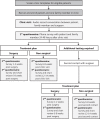Navigating high-risk surgery: protocol for a multisite, stepped wedge, cluster-randomised trial of a question prompt list intervention to empower older adults to ask questions that inform treatment decisions
- PMID: 28554911
- PMCID: PMC5729991
- DOI: 10.1136/bmjopen-2016-014002
Navigating high-risk surgery: protocol for a multisite, stepped wedge, cluster-randomised trial of a question prompt list intervention to empower older adults to ask questions that inform treatment decisions
Abstract
Introduction: Older patients frequently undergo operations that carry high risk for postoperative complications and death. Poor preoperative communication between patients and surgeons can lead to uninformed decisions and result in unexpected outcomes, conflict between surgeons and patients, and treatment inconsistent with patient preferences. This article describes the protocol for a multisite, cluster-randomised trial that uses a stepped wedge design to test a patient-driven question prompt list (QPL) intervention aimed to improve preoperative decision making and inform postoperative expectations.
Methods and analysis: This Patient-Centered Outcomes Research Institute-funded trial will be conducted at five academic medical centres in the USA. Study participants include surgeons who routinely perform vascular or oncological surgery, their patients and families. We aim to enrol 40 surgeons and 480 patients over 24 months. Patients age 65 or older who see a study-enrolled surgeon to discuss a vascular or oncological problem that could be treated with high-risk surgery will be enrolled at their clinic visit. Together with stakeholders, we developed a QPL intervention addressing preoperative communication needs of patients considering major surgery. Guided by the theories of self-determination and relational autonomy, this intervention is designed to increase patient activation. Patients will receive the QPL brochure and a letter from their surgeon encouraging its use. Using audio recordings of the outpatient surgical consultation, patient and family member questionnaires administered at three time points and retrospective chart review, we will compare the effectiveness of the QPL intervention to usual care with respect to the following primary outcomes: patient engagement in decision making, psychological well-being and post-treatment regret for patients and families, and interpersonal and intrapersonal conflict relating to treatment decisions and treatments received.
Ethics and dissemination: Approvals have been granted by the Institutional Review Board at the University of Wisconsin and at each participating site, and a Certificate of Confidentiality has been obtained. Results will be reported in peer-reviewed publications and presented at national meetings.
Trial registration number: NCT02623335.
Keywords: communication; geriatric surgery; question prompt list; shared decision making.
© Article author(s) (or their employer(s) unless otherwise stated in the text of the article) 2017. All rights reserved. No commercial use is permitted unless otherwise expressly granted.
Conflict of interest statement
Competing interests: None declared.
Figures



References
Publication types
MeSH terms
Associated data
Grants and funding
LinkOut - more resources
Full Text Sources
Other Literature Sources
Medical
